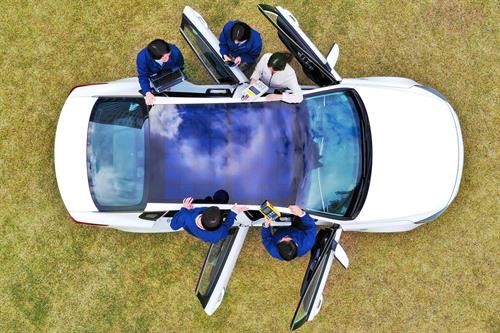Kia and Hyundai are developing solar charging technology for selected future models.
The solar panels will be incorporated into the roof or the bonnet of vehicles to provide additional power, increasing fuel efficiency and range.
The solar charging technology is being developed to support the vehicle’s main power source, improving mileage and reducing CO2 emissions.
It will have the capability to charge the batteries of electric and hybrid vehicles, as well as those of internal combustion engine (ICE) vehicles.
Hyundai Motor Group is developing three types of solar roof charging systems.
The first-generation system, which will be applied to hybrid models, is created out of a structure of silicon solar panels that are integrated into a standard car roof. This system is capable of charging 30-60% per cent of the battery over the course of a normal day, depending on weather conditions and other environmental factors.
The second-generation semi-transparent solar roof will be applied to ICE vehicles, representing a world-first application for the technology. The semi-transparent technologies can be integrated with a panoramic sunroof, letting light through into the cabin, whilst charging the vehicle’s battery at the same time. Applying solar charging systems to ICE vehicles will help them comply with ever more stringent global environmental laws regulating CO2 emissions.
The third-generation system, is currently in testing. It is designed to be applied to the bonnet and roof of a battery electric vehicle models in order to maximize energy output.
“In the future, we expect to see many different types of electricity-generating technologies integrated into our vehicles. The solar roof is the first of these technologies, and will mean that automobiles no longer passively consume energy, but will begin to produce it actively,” said the developer of the technology Jeong-Gil Park, executive vice president of the Engineering and Design Division of Hyundai Motor Group.
“It is an exciting development for us, designing a technology for vehicle owners to help them shift from being energy users to being energy producers,” he added.
Hyundai Motor Group will launch the first generation of this technology into its vehicles after 2019 to help meet global regulations targets and improve vehicle fuel efficiency.




















Chris Byrne - 31/10/2018 11:53
Sounds like a great idea and is obviously something we need to do. What is the estimated impact on cost per vehicle and, I hate to sound negative but, what would be the replacement cost if damaged?